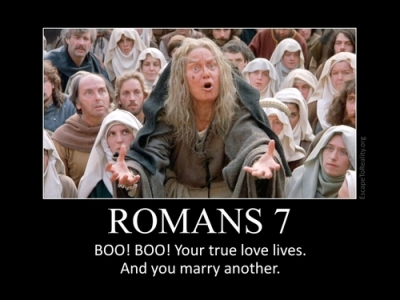“The Romance of Grace” by Jim McNeely

As the message of grace spreads through the church it goes without saying that grace authors face an increasingly difficult challenge; distinguishing their grace book from the plethora of others that have recently hit the market. In The Romance of Grace Jim McNeely does just that. His Romance transcends the feeling of intimacy a grace book naturally generates and takes it to the next level…
God doesn’t just love you.
No indeed.
God is in love with you!
McNeely sets the tone for this passion at the beginning of The Romance Of Grace by invoking an iconic movie about true love, The Princess Bride. Highlighting the scene where Princess Buttercup is being chastised by an old woman, the Ancient Booer, for treating true love like garbage and settling for a love much less true, McNeely ties this cinematic exchange to the real life misery most Christians find themselves in.
We walk with the voice of the Ancient Booer in our ears accusing us of settling for misery – and for no good reason. We have romance in our hands knowing that our true love lives, and we give that up for nothing but petty fears, useless obligations, and secret shames. Truly our great sin is not stealing or adultery, or anger, or false oaths – our greatest sin is that we give up true love. We fall short not of our obligations, but of glory (Rom 3:23). (p.12)
Despite Buttercup’s condescending and flippant attitude toward Wesley’s unconditional love, Wesley pursues Buttercup with a singular passion. He overcomes swordsmen, giants, con men, and death itself to win his True Love! And the church’s “Wesley” is even better…
Morality vs. romance
All grace books address the works vs grace dichotomy. Most followers of Jesus struggle with the weight of performance as an aspect of their faith at some point, and the rest that comes with grace is a welcome message. McNeely, though, addresses the issue with the passion of Solomon writing of his Beloved:
Picture God as a man who is ravaged by his love for a beautiful woman. Such a man’s first thought is not, “How can I get this woman to be more practical and virtuous?” His main thought is, “How can I get this woman to fall in love with me?”… Morals were important enough to send Jesus to the cross, but we are the joy for which he endured the shame. (pp.17-18)
The thought of God being ravaged in his love for us is a message which doesn’t get delivered in the standard sermon. Instead the church, as if it were a grown woman at an orphanage, is told that if we clean ourselves up and patch a couple of holes in our dress, we just may find a suitor who will overlook our obvious shortcomings.
Moral good vs. aesthetic good
Jim McNeely offers a compelling insight into a dilemma that has driven Christians crazy since Paul the Apostle; “Why do I want to do bad things and sometimes not want to do good things?” In Romance he argues that our will is consistently at odds with our heart, acting as a moral bellwether of what we know we should or shouldn’t be doing. Essentially our will is needed to keep our desires in check. In the Garden, because all desire before the fall was life giving, the will was not essential.However:
once the desire for the forbidden entered, at the suggestion of the serpent, the moral and aesthetic good were split. Then our conscience was born and we entered the prison of the ought. (p.22)
Christians then fall into the trap of attempting to strengthen their will to shore up their morality and make themselves attractive to God. In Romance McNeely demonstrates that that mode of thinking – what Paul described as “the flesh” – is something that God seeks not to remodel but to bulldoze. His desire is not for a will so strong it always trumps our desire, but for our desire (the aesthetic good) to once again be for what is life giving (the moral good).
The romance of Grace
The book suggests that the main question for God is not how he can make us good but rather, “How can I get them to respond to my love?” The strength of McNeely’s The Romance of Grace rests in his ability to suggest the notion of God as our lover without the corruption of that notion that a broken culture would produce. Instead McNeely intertwines grace and romance effortlessly and suggests:
He (God) gave us absolute favour and acceptance first, and lets us work out how we live with that afterward. He is looking for a perfection of love, for virtue chosen freely from desire. (p.97)
Yes, we are indeed Princess Buttercup, and our “Wesley” will not stop in the pursuit of his True Love!




